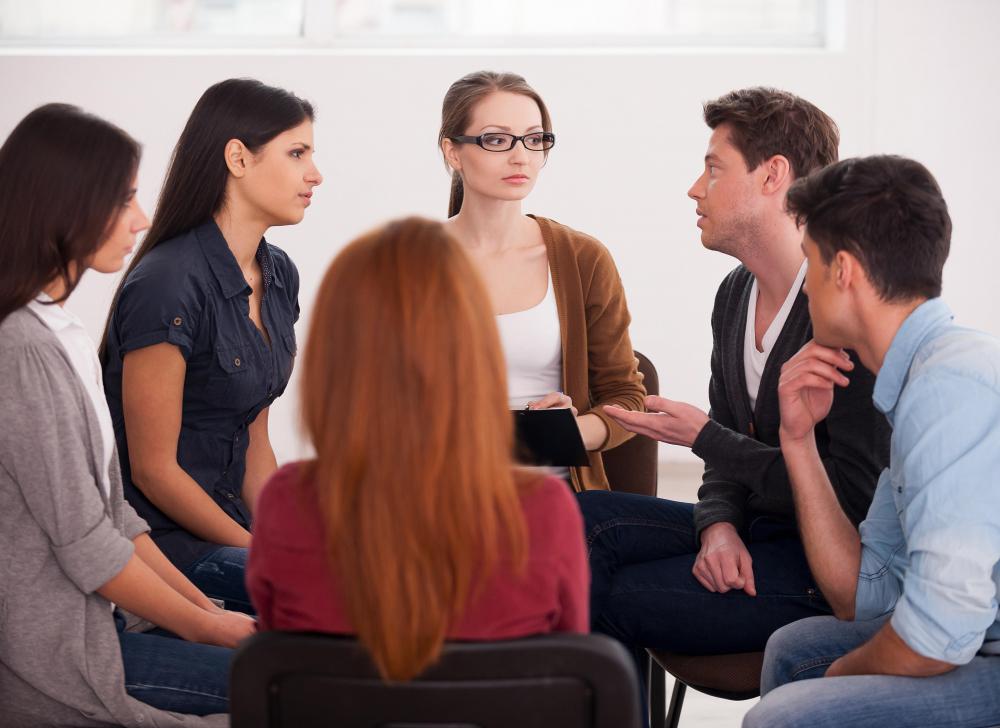At WiseGEEK, we're committed to delivering accurate, trustworthy information. Our expert-authored content is rigorously fact-checked and sourced from credible authorities. Discover how we uphold the highest standards in providing you with reliable knowledge.
What is Ingroup Bias?
Ingroup bias is one among a cluster of cognitive biases known as group biases. Essentially, it is exhibited whenever someone gives preferential treatment to members of a group to which he or she belongs. One of the interesting things about this bias is that has been demonstrated in randomly assigned groups as well as more organized ones; for example, ingroup bias will be exhibited by members of groups which have been created through a coin toss, and also by members of the same sports team, or people of the same religion.
A cognitive bias is a trick of the mind which is supposed to help the brain process situations and other people. There are a large number of cognitive biases; they are collectively studied by social psychologists, who are interested in the way that humans interact with each other. Group serving biases are cognitive biases which are designed to promote the well being of a group, often at the cost of outsiders.

Several factors go into ingroup bias. The first is the group attribution error, in which members of the group credit successes to their personalities, and failures to situational factors. For people outside the group, group members tend to ascribe failures to personality flaws and successes to happenstance of circumstance. Members of an in group also tend to think of members of their group as better than outsiders, and they tend to lump outsiders together, while viewing members of the ingroup as diverse and unique individuals.
Studies on ingroup bias have shown that smaller groups tend to exhibit stronger ingroup bias, perhaps in an attempt to protect themselves from outsiders. This bias has also played a historical role in situations where there is an imbalance of power; for example, many white Americans genuinely believed that African-Americans were inherently inferior in the 19th century.
An ingroup bias can be harmless or very dangerous, depending on the circumstances. Ingroup biases are certainly responsible for the suffering on elementary and middle school playgrounds which is caused by the formation of cliques, and the ingroup bias is also behind religious, ethnic, and cultural wars all over the world. It can be tricky to avoid this bias, although there are a few things to watch out for. If you find yourself in an us-vrs-them situation, look out for blanket statements about “them,” and be wary of discussions in which “we” are automatically assumed to be better.
AS FEATURED ON:
AS FEATURED ON:











Discussion Comments
People who have been in groups with diverse people and have learned to be loyal to people of a different background will tend to not be a prejudices as people who are used to only working with relatively similar people. This one of the reasons why ethnic prejudices tend to be stronger in areas where everyone is the same, and a mutual understanding is not striven for.
If someone wants to avoid being harmed by in-group bias, they will often try to enter the peer group through any means possible, rather than addressing the real issue head on. Entering this kind of a group can be painful and difficult, and in the long run, it eventually just propagates harmful competition. The best kind of groups are those which work for the good of the larger community, and don't have a strong in-group bias.
An in-group will tend to elect its most loyal member as a leader, for the sake of the entire group. This leader will lead the group in a "competition." Competition itself is an attempt to find a group identity in relation to other groups. In reality, every group forms a much larger group, with each part struggling to distinguish itself and rise to the top.
Groups can sometimes be formed by completely arbitrary means, and yet the group will tend to be more loyal to itself than to others. Groups can form other groups within itself, which will sometimes compete as fiercely as the larger group would with others. The multi-tiered nature of the human mind in regards to relationships and loyalties is extraordinarily complex, but sometimes rigid for seemingly arbitrary reasons.
Post your comments